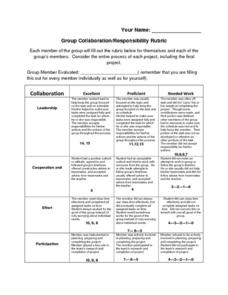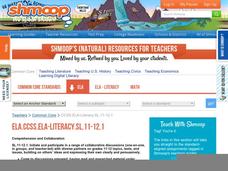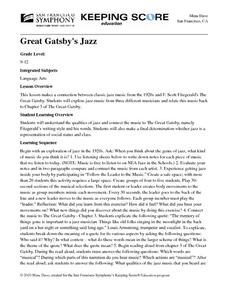Sharp School
You Can't Buy Love - But You May Need Toilet Paper
What will I be? What do I want to be? What will I have to do to achieve this goal? These are the essential questions that launches a research project that asks like-minded individuals to identify their goals, the costs of the practical...
The New York Times
Collateral Damage? Researching a Connection Between Video Games and Violence
Hook your class into an exploration of and discussion about violence in video games with a cute animal clip and a video game trailer. After a quick discussion about how media can affect mood, class members read a related article and...
Boston University
Scramble for Africa
In this fantastic simulation, your young historians take on the roles of imperialistic European countries in the nineteenth century and then "scramble" to carve up the continent of Africa! This is a very hands-on activity that will help...
Southern Nevada Regional Professional Development Program
Vocabulary Activity
Talk about a menu! Who would have thought SAT prep could be so delicious? Treat your class to a full course of SAT words with a timed activity that asks groups to create clues for dishes on their bill of fare. Distained veggies anyone?...
The New York Times
News and News Analysis: Navigating Fact and Opinion in the Times
Help your class understand the difference between fact and opinion by exploring the New York Times homepage and articles. In pairs or small groups, pupils complete a scavenger hunt, answering the provided questions. Next, discuss the...
The New York Times
Decision Point: Understanding the U.S.’s Dilemma Over North Korea
Simulate the Situation Room and analyze the US's relationship with North Korea. The plan starts off with a quick review and an examination of a online timeline that updates as the situation continues. Next, the class reads an article and...
American Documentary
Religion in Culture & Politics: Women’s empowerment in Syria
What defines a woman as empowered, and how does this definition compare to the ideas and actions of a group of Muslim women in Syria? After watching a series of video clips from a documentary film about a school for girls in Damascus,...
The New York Times
Looking for Answers: Making Sense of the Boston Marathon Bombing
How should America respond to acts of domestic terrorism? What motivates or prompts a terrorist attack? After reading an opinion piece on the 2013 Boston Marathon bombing, your learners will critically analyze factors that could have...
Curated OER
The Poetry Archive
Listening to poems about feeling lonely and feeling like an outsider set the stage for a group activity that focuses on Stevie Smith's "Not Waving But Drowning." Groups examine the three stanzas of Smith's poem separately and identify in...
Teach With Movies
Learning Guide to: Schindler's List
Take your history class through Schindler's List with a learning guide, which offers an introduction to the film and a variety of discussion questions and related assignments. There are several useful resources in the sidebar, such as a...
Appalachian State University
Glory: Motion Picture Study Guide
This is an excellent resource for teachers to use for incorporating the motion picture Glory into the classroom! Breaking down the film into particular noteworthy and telling scenes, the guide offers important considerations for each...
The New York Times
Kiev in Chaos: Teaching About the Crisis in Ukraine
Provide a historical context for the political unrest between Russia and Ukraine that began in late 2013. Learners review their prior knowledge and chronicle new understandings with a KWL chart, watch a video explaining the Ukrainian...
Pulitzer Center
Peacebuilding: Taking Home Lessons Learned in Africa
Learners take a closer look at one journalist's work on UN Peacebuilding efforts in four African nations: Sierra Leone, Burundi, Central African Republic, and Guinea Bissau. They collaborate to define peacebuilding and discuss the...
Pulitzer Center
International Aid and Fragile States
"States suffering from internal conflict, weak infrastructures, lack of economic development, and general instability are emerging as a large threat to the international security." What factors contribute to the creation of a fragile...
PBS
An Attack on Syria- What Would You Do?
Has United States military intervention in the conflicts of other countries always been warranted? After reviewing a brief background on contemporary US conflicts and reading articles describing the civil war in Syria, your learners...
Shmoop
ELA.CCSS.ELA-Literacy.SL.11-12.1
You want your class to meet all of the Common Core standards, and here is one way to tackle the first speaking and listening standard. Given a theme to focus on from "How Much Land Does a Man Need?" by Leo Tolstoy, small groups come up...
Shakespeare Uncovered
Merely Players
“. . . one man in his time plays many parts,/His acts being seven ages.” Jaques famous speech from Act II, scene vii of As you Like It sets the stage for an examination of the roles people play. Class members not only consider the roles...
Curated OER
What Are the Advantages and Disadvantages of Conforming?
Dive into Arthur Miller’s The Crucible and determine what it means to conform in society, and discuss as a group with the thoughts and plans available in these documents. Included are multiple activities and brain targets that form the...
Curated OER
Great Gatsby's Jazz
As Nick wanders the grounds of Gatsby's mansion, he observes the behaviors of the rowdy guests and listens to the music pouring over the lawn. Bring the music of the jazz age into the classroom with Louis Armstrong's "West End Blues,"...
Japan Society
Changing Times, Changing Styles: New Japanese Literary Styles of the Late Nineteenth Century
Focusing on Doppo's "Unforgettable People" and late nineteenth century Japanese literature, this resource also leads to discussions of form being dictated by content. Explore the development of new literary styles first-hand by...
Japan Society
Nature and the Environment in Postwar Japan
Japan has a complex relationship with the environment. Explore this relationship with your class through this resource. Included are thought questions, several activity ideas that range from writing, to discussion, to research, and an...
Academy of American Poets
We Sing America
Pair the famous poems "I Hear America Singing," by Walt Whitman, and "I, Too, Sing America," by Langston Hughes, with a more recent poem by Elizabeth Alexander called "Praise Song for the Day" to demonstrate a theme and introduce your...
Curated OER
From Light to Dark and Back
Experiment with light and dark in a series of interactive activities that lead up to reading and writing poetry. Class members have the opportunity to observe their feelings while sitting in the light and dark and to play with shadow...
Curated OER
Structure of Natural Narratives
Class pairs select a prompt from a provided list and tell (and record) their story to their partner. They then examine linguist William Labov's model for natural narratives, and apply his model to their tale. Next, class members watch...

























